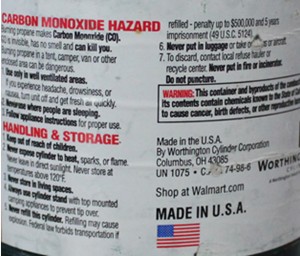http://www.StartALawnCareBusiness.com
Judging by the quantity of email we received last week on our recent post about the viability of propane powered weed trimmers and their taking over the lawn care 2-cycle engine market, we feel we are correct in thinking that propane is making a strong toe-hold into the lawn care market.
There is one question we are continuously asked; “Is it legal to refill and transport 1 lb. propane canisters in the use of my Lawn Care Business.”
To be quite up front and honest, we are not 100% sure of the answer to this question. There is lots of debate to this question and without a clear understanding to the answer, our stance is that you should research the correct answer yourself. If you find a complete and easily understood answer, please let us know.
We have heard differing theories on this law. A commenter on www.Instructables.com posted this information:
There is no federal (U.S.) contraint whatsoever on refilling a tank, nor for that matter on transporting such a tank whereever you want (provided it is not a federally-controlled road with restrictions on hazardous materials, which is a section of the CFR that nobody here has bothered to point out). There could not possibly ever be any such global constraint on your right to do so under the 10th Amendment. The cited regulations and laws deal specifically with transport in commerce, that is, transport across state lines for the purpose of selling the tank or using them in support of a commercial enterprise (and, under several federal court cases dating back to the 1930s, commercial transport on federally controlled roads – the so-called “implied commerce” argument that gave us the FDA and EPA). The second item is this talk about it being illegal to transport, even in commerce, REFILLED tanks. That is nonsense. It is not illegal to transport a refilled tank, it is illegal to commercially transport improperly LABELED tanks – if you read the citation for 49 U.S.C. 5124 (that’s the one with the prison sentences and all) you’ll see that it establishes penalties for violation of 21 U.S.C. 5104. Section 5104, in turn, is not a REFILLING statue, it is a LABELING statue. The moment you refill a tank you may or may not have created a fire hazard, but you a very definitely created a mislabeled product – and that’s what is illegal.
If you are considering refilling 1 lb. propane bottles, using them in weedeaters or other lawn care equipment, and/or transporting them as a due course of your business, our main fallback answer is to tell you to read the label of your 1 lb. propane bottle. It clearly states:
Never Refill This Cylinder. Refilling may cause explosion. Federal law forbids transportation if refilled – penalty up to $500,000 and 5 years imprisonment (49 U.S.C. 5124)
Look at #5 in this picture:
If you are running propane powered lawn care equipment, we would love to hear from you. Leave a comment. Also, if you are operating a lawn care business and want to learn about the latest lawn care equipment, check out our lawn care business guidebooks and estimating software located at our main website:
